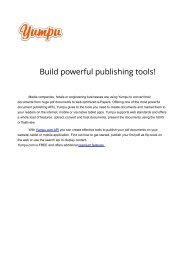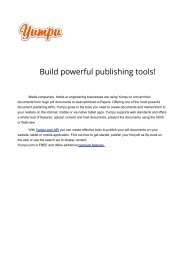test_pdf.pdf
You also want an ePaper? Increase the reach of your titles
YUMPU automatically turns print PDFs into web optimized ePapers that Google loves.
ADDRESSING<br />
FUTURE<br />
ARMS<br />
CONTROL<br />
AND SECURITY<br />
PROBLEMS<br />
would take some kind of Manhattan Project. Unfortunately, the laws of physics aren’t set up that way. I wish that<br />
were true. It turns out, in fact, particularly with highly enriched uranium, from which you can make a simple guntype<br />
bomb, that making a nuclear explosive is little more than getting two pieces of highly enriched uranium<br />
together fast enough. It’s potentially well within the capabilities of a sophisticated terrorist group like al Qaeda.<br />
Unfortunately also, it’s not as hard as it once was to get the nuclear material. I’ll talk about that more in a minute.<br />
It’s not only the former Soviet Union but also many countries around the world this material is inadequately<br />
secure.<br />
One of the reasons that we haven’t seen more action coming out of this administration on this agenda, even<br />
though we do in fact have a president who seems to be quite alarmed about the possibility of terrorists getting<br />
weapons of mass destruction, is that there’s a belief that it would really take a hostile state to provide them these<br />
kinds of weapons. Therefore, the answer, the policy prescription is to take on the hostile states. It’s certainly<br />
conceivable a hostile state might provide weapons of mass destruction to terrorists, though I personally believe<br />
it’s extremely unlikely. But there are other routes. Those routes have to be closed down. We can’t rely on offensive<br />
action against hostile states to do that. Nor can we rely on our ability to stop things coming into our country. After<br />
all, thousands of illegal aliens and tens or hundreds of tons of illegal drugs come into our country every year<br />
despite our efforts to stop them.<br />
I’m going to skip over some of this material because Biden covered it. This is just a photo of Hiroshima, just<br />
to remind ourselves. That was a gun-type, very simple gun-type bomb.<br />
Now a lot of people say, well, this was a big deal in the 1990’s when highly enriched uranium was showing<br />
up in cars in Prague and so on, but that hasn’t been on the front pages of the papers lately. Surely that’s pretty<br />
much taken care of by now. Unfortunately, that’s not the case. Russia is a very different place today than it was<br />
five or ten years ago. The economy is growing. The government actually has a budget surplus. The government is<br />
in significantly firmer control of a variety of things than it was a few years ago, and in particular nuclear workers<br />
are getting paid a living wage on time. So we no longer have, as we did in 1998, for example, guards at nuclear<br />
facilities leaving their posts to forage for food, electricity that ran the alarm systems at nuclear sites being cut off<br />
because the site hadn’t paid its electricity bill, and so on.<br />
Nonetheless, the people who actually go to these sites on a regular basis continue to report that when you<br />
get there the fence is often broken down, has holes in it, the intrusion controls are no longer working. These are<br />
kinds of systems that need to be maintained regularly, particularly in the harsh weather in northern parts of<br />
Russia, and that level of maintenance is not happening. So we continue to have serious weaknesses in the<br />
security systems—and also in the accounting systems, by the way. The accounting systems in Russia were really<br />
designed to make sure that production was within a couple of percent of input at a given facility—so that you<br />
were meeting quota—rather than designed to detect theft. And the reality is that no one will ever know how much<br />
material has already been stolen because the accounting system isn’t good enough for anyone to ever be able to<br />
determine that.<br />
But in addition to the vulnerabilities being high, the threats remain high. The Russian officials have acknowledged<br />
four cases, very recent cases, 2001 and 2002, of terrorists carrying out reconnaissance at Russian<br />
nuclear warhead storage facilities or Russian nuclear warhead transport trains. The locations and schedules of<br />
those trains and storage sites are secret. That secrecy is a very, very important part—I would say the largest part—<br />
of the security regime for those facilities. So it’s really quite scary that the terrorists were able to penetrate those<br />
secrets.<br />
Now we know that in October 2002, 41 heavily armed and suicidal and well-trained terrorists struck<br />
without warning and seized a Moscow theater. Russian officials have indicated that those terrorists considered<br />
seizing the Kurchatov Institute before they decided on seizing the theater. At the Kurchatov Institute there’s<br />
hundreds of kilograms of highly enriched uranium, enough for dozens of nuclear weapons. And I have to say that<br />
most nuclear facilities’ security arrangements in the world, including most in our country—certainly for civilian<br />
facilities but even for some military facilities—would not be able to reliably defend against 41 heavily armed<br />
suicidal guys arriving with absolutely no warning and with a decent plan of attack.<br />
This is not just a Russia problem. There is weapons-usable nuclear material in hundreds of buildings in<br />
more than 40 countries worldwide. Some of the security for that material is excellent, but some of it is very, very<br />
bad. There are no binding global standards in place. There are more than 130 operational research reactors fueled<br />
with highly enriched uranium, the easiest material in the world for terrorists to make nuclear bombs from, in more<br />
than 40 countries. Most of those have no more than a night watchman and a chain link fence for their security. The<br />
one down the street from me in nuclear-free Cambridge at MIT, which operates on 93 percent highly enriched<br />
uranium, after September 11, added a guard. There’s a Cambridge police officer who literally stands on the street<br />
outside the reactor, and obviously would be dead within seconds if anybody ever actually attempted to attack that<br />
52<br />
52
















